Warning: Contains full spoilers for Rogue One: A Star Wars Story
Let’s get something straight off-the-bat: I didn’t want to write this article. I don’t like feeling disappointed by media, and I don’t think it’s vogue to write take-downs of popular movies when writing odes of love is much more fun.
I also didn’t think this movie was unenjoyable. As Jeremiah said in his review, “Rogue One is never boring. It’s never confusing. It’s never bad.” It was fine.
Keep in mind, this is the first Star Wars “stand-alone” film. This is the movie Disney is going to be taking its cues from to see what is possible in the universe—what tests well. As someone who’s been a fan of the franchise my entire life, the idea of having movies of this nature was nothing but exciting. Sure, franchises like Marvel are overdoing it, but this is a universe that’s incredibly expansive, and just we’re at the very beginning, dipping our toes in.
It could have been great. It very nearly was great.
In fact, for me it almost felt as though the writers asked for my wishlist of what a stand-alone film should contain, since these were the elements we got:
- Gap-filler (i.e. not taking place before the Prequels nor after The Force Awakens)
- A story about the little guys, the cogs in the wheels of the bigger machines
- A fraught father-daughter relationship serving as the motivation for a protagonist
- Engineering drama
The issue was that while these elements were present, their execution was never there. The movie seemed to flirt with these ideas, until ultimately falling back on the sweet, sweet comfort of Darth Vader. (Which, as a quick side-note, is hilarious to think about if we pretend this was truly a stand-alone film that some people went into blind. Can you imagine how utterly weird that sequence must have felt for them? “Who is this guy? Why is this the conclusion?”)
Still, let’s dive a little deeper to see what fell flat.
A Gap-Filler Story
When I first heard the pitch for Rogue One as “the movie where they steal the Death Star plans,” my mind immediately went to this:
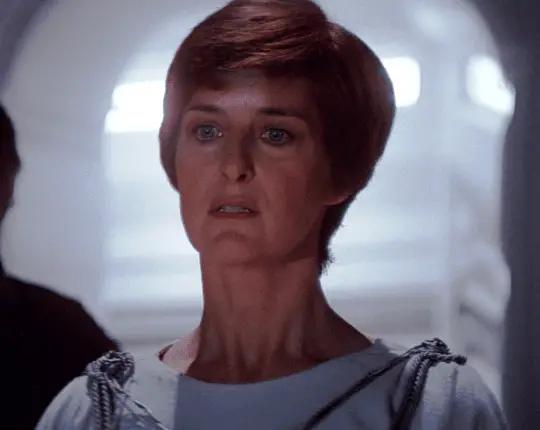
After all, this was a canonical off-screen mission involving sacrifice to obtain the stolen plans. My mind did not go to this:
Vader: Where are those transmissions you intercepted?
Look. Had everything else in Rogue One been spot-on, particularly the emotional stakes and characters, I really wouldn’t care about the retcon. But there is no escaping the fact that this entire movie’s existence contradicts the events of A New Hope.
There just…there didn’t need to be an explanation for it. The Rebels intercepted a transmission containing the battle station’s plans with what sounded like a simple intelligence hack, and then scanned the technical drawings hoping to find a weakness, because that’s what you’d do when your enemy builds a super weapon. Having a story surrounding these plans was passing odd, especially since part of the plotline involved everyone in the Rebellion learning about the Death Star. Wasn’t Alderaan’s destruction supposed to have been a bit surprising?
Again, in the scope of things this is a minor complaint. But when the job of a stand-alone film is to flesh out the universe outside of the Skywalker framework, and the first one we get starts by retconning the original film, it’s not exactly a flattering look. Why not have this be the Bothan film?
A Story About the Little Guys
I unabashedly love pieces of media set in a universe with these big heroes that focus on the everyday man. It’s why the entire concept of Agents of SHIELD is appealing to me, even if it thinks its characters need to keep mentioning Thor to be cool.
Perhaps part of the issue for me with Rogue One was that I had just read Gotham Central, so the bar was raised pretty high in terms of how you could take a concept like that and make it work through a compelling cast of characters. Unfortunately, and unlike Jess, I found this cast utterly flat.
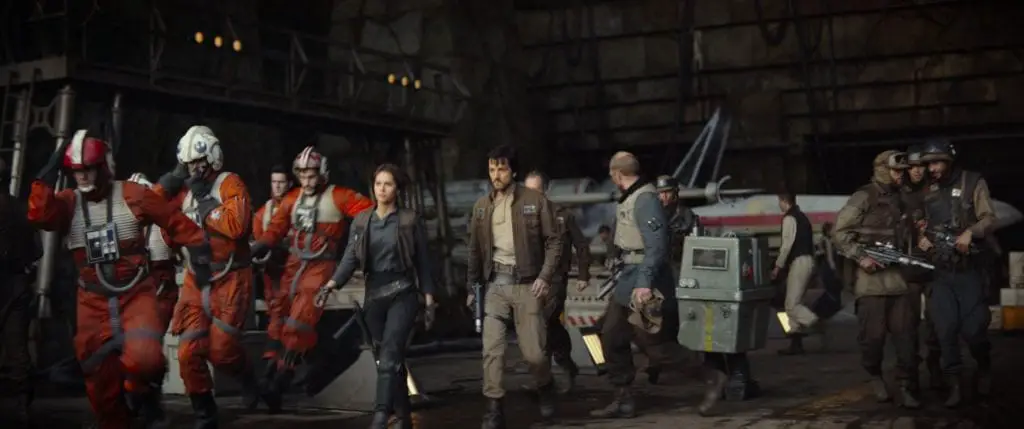
If you made me talk about each character, I’m not sure I can adequately explain why I felt nothing for them. I think it’s mostly due to the fact that their group dynamics, aka the only lens we have into these characters short of exposition dumps, were largely unfocused. There were hints of how they played off of each other, but no real cohesion.
You could see that Jyn and Cassian’s relationship was evolving (though frankly there was more of hard-earned arc with Jyn and K-2SO), you could tell that Baze and Chirrut were married close and protective of one another, and you could kind of see that Bodhi thought Cassian was a-okay. Yet none of it was particularly deep, and it certainly didn’t extend across the group.
When Baze called Jyn Erso “little sister,” I remember giving a side-eye to the complete stranger sitting next to me. I think he might have found it less out-of-place, though.
What’s more frustrating is that the opening sequence set-up an interesting dynamic between Krennic and Galen Erso, which it completely ignored for the remainder of the film. Krennic had the potential to be an compelling antagonist thanks to this personal connection, which inherently tied to Jyn’s own motivations for being on the mission. But…nothing came of it. At all. Jyn told Krennic who she was and the dude couldn’t even muster a shrug, which was about all he managed for Galen’s death in the first place. Weren’t they working together for years?
Though admittedly, part of my frustration here is that I have a penchant for characters like Krennic—the sort of middle management bad-guy who’s in a little over his head and answering to people like Tarkin. He had the makings of a nuanced antagonist based on his first scene, but then became progressively flat as the movie rolled on. In the end, he was a project lead who wanted his work implemented. Especially because things go poorly for Imperial managers who fail at their job.
On their own, the protagonists are shells of characters as well. It’s not that they’re bad, and you can certainly stuff them with some really good spinach and mozzarella if you’re willing to put in the time. But we’re only given the basics of their personalities, and then expected for that intrigue to carry us through.
Cassian was introduced to us as a scoundrel-lite in his opening scene, thanks to that morally ambiguous murder. But then he’s just a dude on a mission for the rest of it. Even his instructions to kill Galen turned into a big ball of nothing. The set-up was there for him to have to make a difficult choice, thanks to his burgeoning affections for Jyn. Why not do something with that? Anything that would have made the personal conflicting with the political task-at-hand!
Chirrut felt like an intriguing character and helped to flesh out the mythos of the force a bit, but also was completely stagnant. There’s no arc to speak of (and forget even trying with Baze), there was no reason to believe he wouldn’t sacrifice himself for the cause, and then the guy didn’t even go down with a fight, despite his earlier encounter with the stormtroopers being arguably one of the best action sequences in the film.
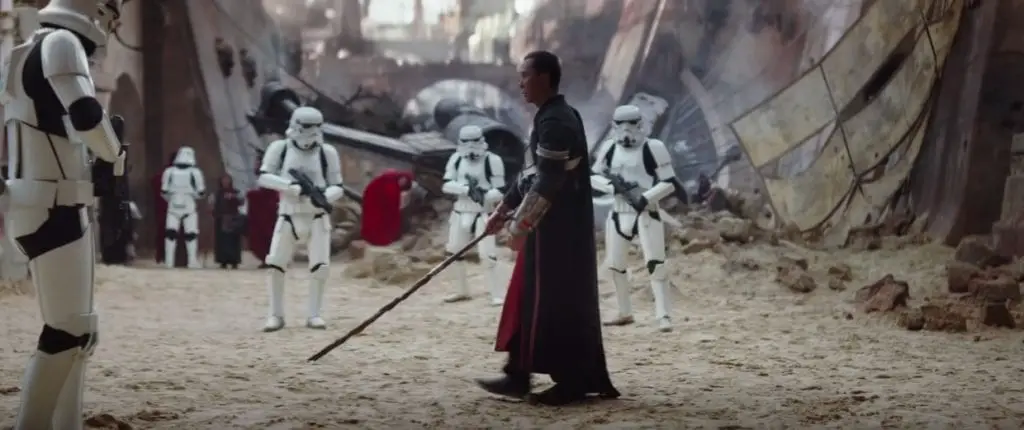
And Bodhi, poor Bodhi. Finn is proof that defecting soldiers can be incredibly engaging characters. Bodhi is proof that you still need to put the effort in to make that so. He had nothing to do, he had no arc to speak of, his torture at the hands of a mind-reading squid was never explored, and even his “for Galen!” attitude was based on a relationship we were only told existed, never shown.
Speaking of Galen…
A Fraught Father-Daughter Relationship
The Galen/Forest Whitaker/dead mom/renegade backstory and source of motivation for Jyn felt incredibly forced. It’s odd because there was no individual part of it was bad. It’s at least complicated to think about from a Watsonian perspective:
As a kid Jyn watches her mom get shot to try and prevent her dad from working for the evil Empire again, and she runs and hides while they take Galen anyway. Then Forest Whitaker’s character (“Saw Gerrera”—I’m sorry, there’s no way anyone knew that walking out of the theater) rescues her, raises her for years as an anti-Empire soldier, then ditches her “for her own safety.” She ends up falling in and out of trouble, believes her dad has completely sold his soul to do terrible things for the Empire, and has huge resentment/abandonment issues surrounding Saw Gerrera, which contributed to her entire “just don’t look up at the Imperial flags” mode of operation.
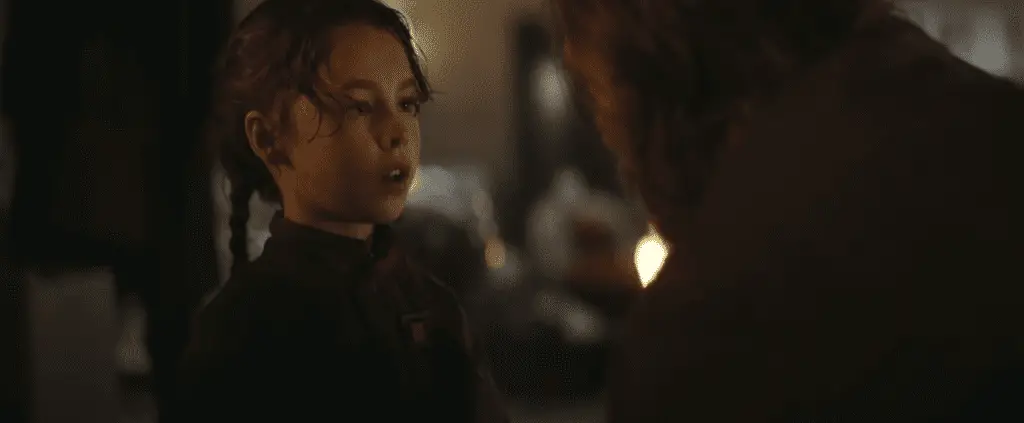
There’s good stuff in there, really! Especially the part where there’s something fundamental about her father that she misunderstands for a decade, and when she is clued into how he really feels, she is completely and unabashedly committed to him and to making his efforts count. Which is something that usually leaves me on the floor, clutching my chest for hours.
Unfortunately, this didn’t really come across as I was sitting in the theater. I think the biggest problem in the execution was the Hologram of Important Plot Information and Paternal Love. It felt oddly convenient, oddly specific, ridiculously long, and reliant on some bizarre character choices.
Step back and consider this: Galen sends his coworker (Bodhi) to get information to the sort-of Rebel guy (who’s really just a loner extremist) to let him know that there’s a flaw in the Death Star and plans that can be located, but then in the off-chance this guy knows where his possibly-dead daughter is, he also addresses his entire message to her along with a full and detailed confession about why he behaved exactly as he did. At which point you have to wonder: couldn’t he have somehow included the plans in this hologram?
It was tonally…off. And for the life of me I can’t figure out why they didn’t have the moment everything changes for Jyn being the result of a direct conversation with her father. It would have raised the emotional stakes, it would have side-stepped the weirdness of why the hologram felt like Galen was an NPC giving specifically his daughter a quest, and it would have made the emotional punch of his death actually land.
Heck, it even would have allowed for a more organic reason to get Jyn involved in the first place! It’s not that the whole “Rebels distrust Forest Whitaker” tension didn’t make sense, but the necessity of Jyn herself establishing the connection between those two camps is questionable at best. Why not instead have it be that the Rebels are given a message from Galen that explains there’s a flaw in the design and they need to get the plans, and the Rebels are incredibly skeptical. Still, the rewards of being able to stop a planet-destroying super-weapon outweigh the risks of this being a potential trap, so they want to go for it anyway. They bring Jyn along either because a) she’s the only potential person who could get Galen to speak candidly, or b) as a life-insurance policy in case this was to lure the Rebels to their doom.
We could have seen Jyn struggling with how to conceive of her father on the way: does she have hope and optimism that he’s earnest and tries to defend him to the Rebels as a result? Does she truly believe this could save his legacy? Is she still cynical and jaded given the image of him she’s built up in her mind all these years? These possibilities could even sit in contention, with her instinctively rushing to his defense with the nay-sayers on the mission, yet still showing anger and disappointment in him when they finally meet. He’s built other weapons… It’s not like there isn’t the ground work there for her to call him a “coward” to his face while he shrinks under the guilt of having to leave her and begs her to make things right.
This is, of course, one option. But I’d really take anything over that hologram and Jyn’s instantaneous change in outlook and motivations. At the least could it have been a hologram phone call so that this was a dialogue? Maybe it’s rushed since Galen is taking a big risk here?
Also, that issue is compounded by the fact that Jyn gets over her feelings of abandonment with Forest Whitaker and her misconception of her father within the span of five minutes, which is then immediately followed by Forest Whitaker dying for no goddamned reason. All of these “emotional” moments had the effect of cancelling each other out in a weird way. It’s not that double father-figure issues can’t work—just look at Marceline—but in the span of a two hour film where the last hour was already set aside for the main action piece, it was too much.
And even Jyn’s newfound hope and sense of duty in stopping the Death Star had some of the emotional weight taken out of it since she was basically arguing against strawmen. The entire Rebel Alliance learns about a weapon with the Death Star’s potential, and she’s the only one who thinks it’s worth stopping? It’s not that I didn’t want Jyn to give a Katara-style speech, but the scope of it seemed forced. Why not just have her rouse her crew, the people that supposedly come to mean something to her (and the audience), and it’s a subtle tonal shift to her becoming the leader of the mission?
Something needed to be streamlined here. Laying it all out like this, I’m not actually sure why it was even necessary for Jyn to think ill of her father in the first place; she could tell he was no friend to the Empire when she was a little girl, and maybe could assume he was working under duress. Sure, she would have been more optimistic from the start, but that doesn’t seem like a necessarily bad thing. There’s this idea that having a jaded, hardened character at the start automatically creates a more complex personality.
Yet all it really did was make her about-face jarring. Option #2: Jyn could have always wanted in on the mission to try and clear her father’s name, and perhaps the tension between that and Cassian’s own mission to kill Galen could have been an actual source of conflict.
Still, I’m being completely honest, one of the biggest issues with Jyn’s story was that Galen’s actions didn’t make much sense.
The Disgruntled Engineer
First, let’s talk about the elephant in the room: the exhaust port being an intentionally planned “fatal flaw” in the Death Star was another retcon. Numerous characters in A New Hope talk about how the Rebels need to run an analysis of the intercepted transmission, which means they don’t know that there was a weakness already.
However, there’s also the fact that the exhaust port they find wasn’t really a plot-hole that needed explaining. A battle station that size would have venting needs, I’d imagine, and the point of it was that it was the hubris of the Empire that was its own undoing.
General Dodonna: Well, the Empire doesn’t consider a small one-man fighter to be any threat, or they’d have a tighter defense. An analysis of the plans provided by Princess Leia has demonstrated a weakness in the battle station.
It’s a thematic weakness. One that proved Leia’s point in her comment to Tarkin:
“The more you tighten your grip, Tarkin, the more star systems will slip through your fingers.”
This isn’t midichlorian-level of unnecessary explanation, but it does take away a bit of its impact.
I know this is a nitpick.
Less of a nitpick is that an engineer of Galen’s prowess (and in his position) would probably have been able to integrate a weakness that’s a little more…accessible to the Rebel cause than this. Why didn’t he try and rig something so if the Death Star fired, it’d malfunction and damage itself?
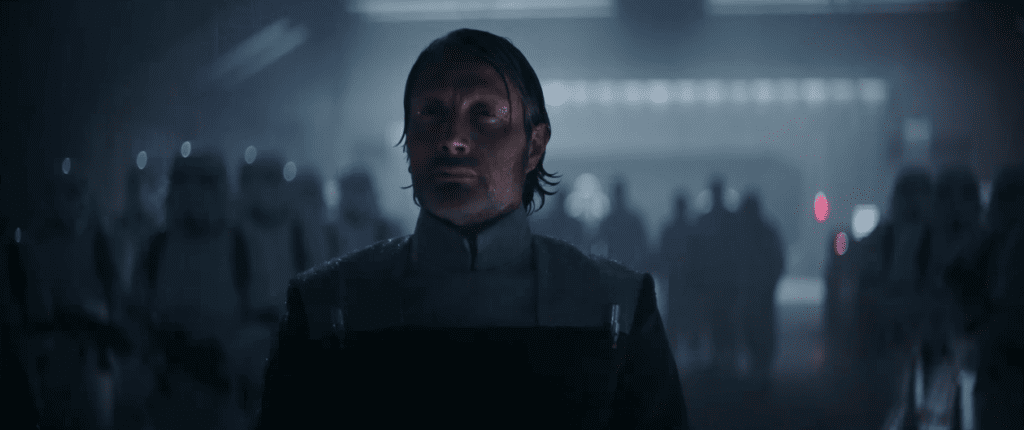
Also, Galen’s entire motivation for agreeing to work on this was to protect his family. But then Jyn had to be ditched by Forest Whitaker because she might be a hostage anyway. Of…who? The Rebels? The Empire had Galen working for them already, so it’s not like they’d need more leverage. It also seems unthinkable that Galen made himself so instrumental to the project, yet the best he could do was get a hologram smuggled away where he talked about the location of the technical data.
And poor Jyn’s mom: her death really didn’t accomplish a single thing.
Again, this could have worked—the engineer caught in the Empire’s net, wanting to do what was right. There’s entire movies about the moral dilemma of the Manhattan Project. The issue was in the execution, not only for undercutting the film it’s supposedly setting up, but in how Galen’s plan played out: a series of contrivances including the hologram, which led to what can best be described as a heist pulled off by characters who barely seemed connected to each other.
What Was Left
The elements I’ve listed…that’s all they are. Elements played with that showed the makings of a really good plot.
But the thing is, we didn’t actually need a perfectly executed father-daughter drama, we didn’t need a thorough look into Imperial corporate politics, and we didn’t even need canon-compliancy. We just needed characters that made us feel something. I would have happily taken a two-hour movie that had nothing but Rebel hackers sitting around a computer trying to intercept data if there had been some semblance of interpersonal tension and passion. Call me crazy, but I have a feeling 12 Angry Men will have more rewatch-value in the years to come.
Rogue One could have made us feel something, had more of the focus gone to developing the relationships. I realize they were all doomed, but that’s the entire point of a movie centered on a heroic sacrifice. I wanted to feel like Mon Mathma, talking about those poor Bothans when I walked out. Instead, I was left trying to remember what Chirrut’s husband’s name was.
I can’t really fault Disney for the included fan service, even if Vader was hilariously out of place. They were trying to test a new, stand-alone concept, but didn’t want to take a huge risk this early on. And as I said, it was an absolutely fine viewing experience.
What concerns me, however, is that the positive feedback feels weighted towards the action sequences, and the direct set-up for A New Hope at the end. Rogue One never had to be fantastic, but if Disney takes this as a sign that it’s the fault of the “little guy”—that we can’t care about the characters outside the Skywalker paradigm—we may have to settle for more and more aimless scenes of Darth Vader slashing at things while badass music plays. It’s no more than what we were left with anyway.

